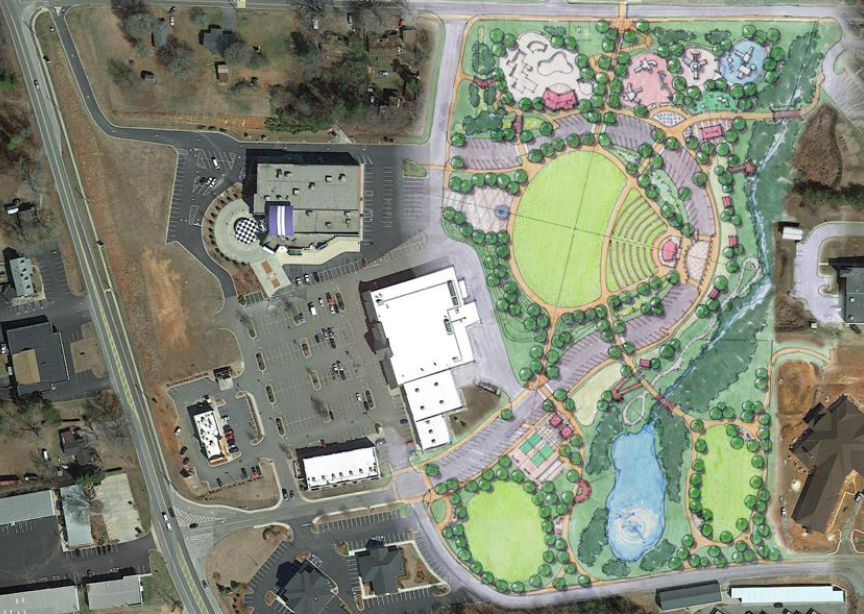City residents will at last see dirt moving behind the Dawsonville Municipal Complex as the city council on Monday voted to award a $1,454,169.54 contract to TW Phillips Grading for phase one construction of Main Street Park.
TW Phillips Grading was one of two bids received and was the low bid by about $6,000.
The council voted 3-0 to approve the bid, with council member Caleb Phillips abstaining from any discussion or vote as he is related to the proprietor of the company that will be performing the work.
The funds for phase one of the project will come from SPLOST VI and the construction timeline is 120 days. This phase will consist of installing a road that runs through the park as well as grading and grassing the land.
The current site plan for the park shows that it will contain public restrooms, a playground, a splash pad, walking trails, picnic areas, open fields and an amphitheater, as well as potentially volleyball or bocce ball courts.
Phase 2 will include construction of the playground, which will be accessible for various ages and abilities, as well as construction of the restrooms, picnic areas and picnic pavilions along the walking trails. The amphitheater will also be staged at that point, according to Planning Director Casey Majewski.
Phase 3 construction will include the splash pad, exercise machines along the nature trail as well as construction of the amphitheater.
The Downtown Development Authority closed on a loan to buy the 18 acres for the park on July 25, 2014. The city has projected to spend $2 million of SPLOST VI revenue on the park. The city also received a $100,000 grant from the state’s Recreational Trail Grants program to build walking trails at the park.
Other business:
Budget hearing held
No one spoke for or against the proposed FY 2018-2019 budget during a public hearing held Monday night. The budget was presented by City Finance Administrator Hayden Wiggins May 21 and balances revenue and expenses amounting to $5,755,543, an increase of $726,777.30 over last year’s budget.
The council could vote to approve the budget at its June 18 meeting. The budget would take effect July 1.
Farmers Market
City manager Bob Bolz said that plans to demolish the homes at 124 Allen Street and 82 Allen Street for the city farmers market are moving forward. The city is obtaining cost estimates on demo and clearing the lots, and Davis Engineering has begun engineering the project.
Bolz has said that the farmers market will help tie Main Street Park into downtown Dawsonville, and plans are for a series of large covered pavillions with concrete floors and bathrooms attached, where vendors can set up and sell their wares, as well as give shelter for events like the Mountain Moonshine Festival.
Food Truck Night
A second food truck night will be held from 5 p.m. to 9 p.m. June 22 on Bill Elliott Street and Tucker Avenue in downtown Dawsonville. Food trucks, music, activities and the Amicalola Regional Farmers Market will provide food and entertainment for the evening.
Rezoning approved for Howser Mill Road subdivision
The council voted to approve a rezoning request for two parcels of land next to Howser Mill subdivision for a new 65-lot subdivision.
Adam Smith and Matthew Richardson requested that the total of 21 acres be annexed into the city and rezoned to R3, or single family residential zoning.
The council voted unanimously to approve the request with several stipulations. Council member Jason Power recused himself from the vote.
The stipulations recommended by the city planning board state that the developer must install sidewalks and include an amenities package, as well as have a traffic study conducted, plant a 10-foot buffer along the common property line with Howser Mill subdivision, and create a neighborhood homeowners association with restrictive covenants. A stipulation added by the council states that the homes can be no smaller than 1,800 square feet.

